Wie stellen wir uns eine zukunftsfähige Ernährung vor? Vielleicht mit Gemüse aus „essbaren Städten“, regionalem Bio-Fleisch in der Kantine und Algen vom Bauernhof? Auf jeden Fall mit gutem Essen für alle. Mit mehr Wertschätzung und weniger Verschwendung von Lebensmitteln. Wie kommen wir dahin? Welche guten Beispiele gibt es schon? Und wie kann jede und jeder selber aktiv werden und eine lebenswerte Zukunft mitgestalten?
Überall in Deutschland machen sich bereits Menschen für nachhaltiges Essen stark. Sie zeigen, was schon heute möglich ist und was in naher Zukunft. Sie machen Mut und motivieren zum Mitmachen und Nachmachen. Sei es durch das persönliche Essverhalten, in Initiativen, eigenen Projekten oder im Beruf.
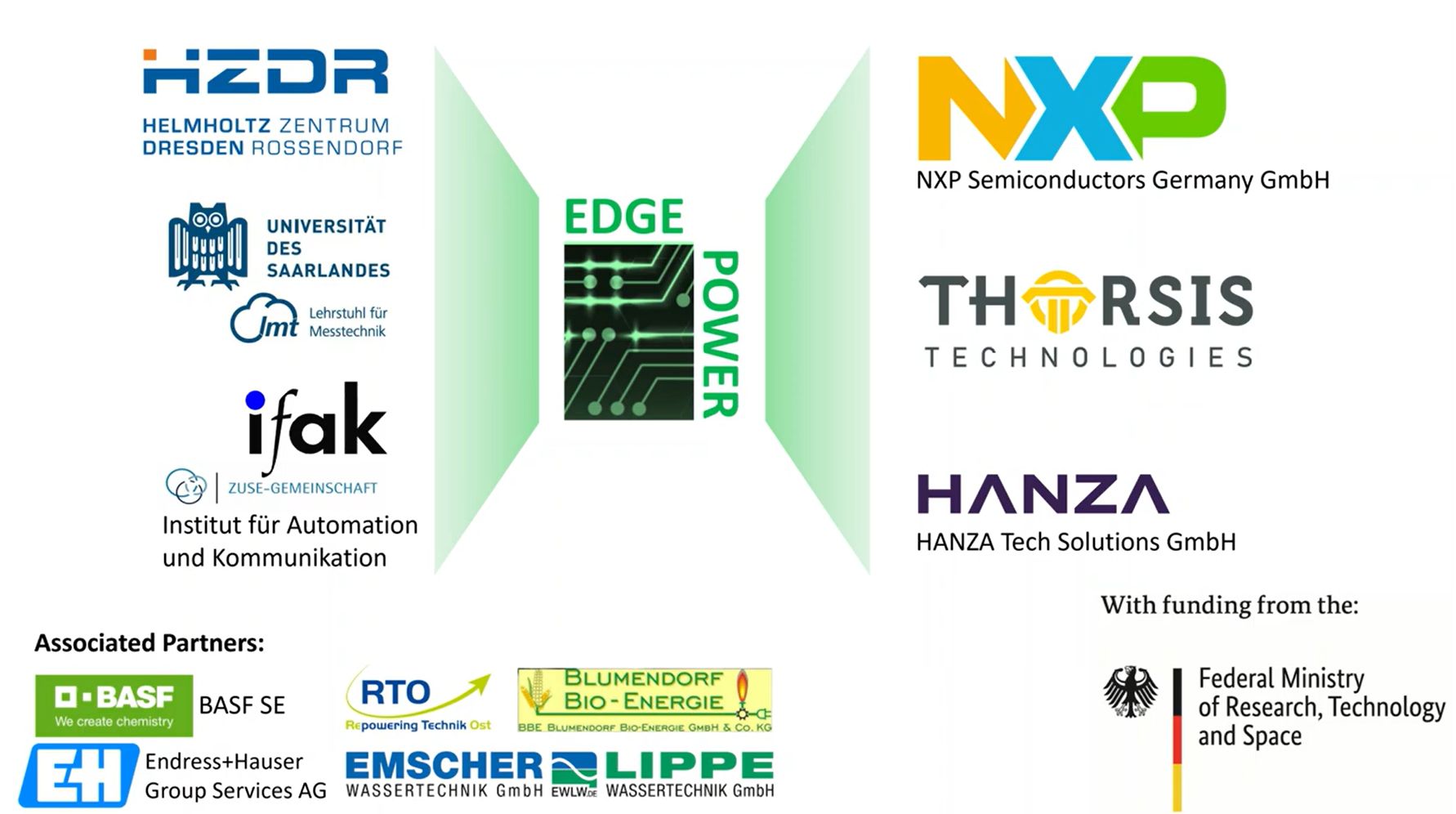
Auf der Fachkonferenz „Edge-Computing 2025: Von der Forschung zur Anwendung“ präsentierte das Edge-Power Konsortium seine gemeinsam erzielten Projektergebnisse. Diese Video-Präsentation ist auch öffentlich verfügbar bei Youtube.
Der Beitrag des Lehrstuhls für Messtechnik waren interpretierbare und energieeffiziente ML-Algorithmen, wobei unser FESC/R (Feature Extraction, Selection and Classification/Regression) Ansatz als tiefe neuronale Netzwerke repräsentiert wurde, um besonders effizient auf AI-Beschleunigern ausgeführt zu werden (im Video dargestellt ab Minute 10:00). Wir danken allen Partnern für die hervorragende Zusammenarbeit.
At the conference “Edge Computing 2025: From Research to Application,” the Edge-Power Consortium presented its joint project results. This video presentation is also publicly available on YouTube.
The Chair of Measurement Technology contributed interpretable and energy-efficient machine learning algorithms, with our FESC/R (Feature Extraction, Selection and Classification/Regression) approach represented as deep neural networks for particularly efficient execution on AI accelerators (presented in the video starting at 10:00). We thank all partners for the excellent collaboration over the course of this project.
Weitere Veröffentlichungen aus dem Edge-Power Projekt / further publications from the Edge-Power project:
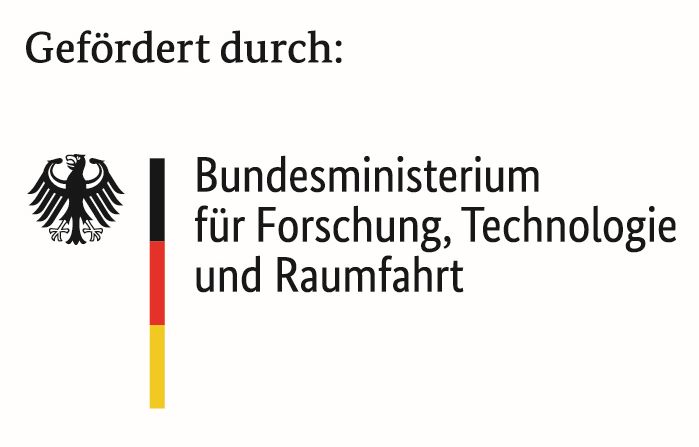 Das Projekt Edge-Power wurde gefördert vom Bundesministerium für Forschung, Technologie und Raumfahrt (BMFTR) in der Fördermaßnahme „Elektroniksysteme für vertrauenswürdige und energieeffiziente dezentrale Datenverarbeitung im Edge-Computing (OCTOPUS)“.
Das Projekt Edge-Power wurde gefördert vom Bundesministerium für Forschung, Technologie und Raumfahrt (BMFTR) in der Fördermaßnahme „Elektroniksysteme für vertrauenswürdige und energieeffiziente dezentrale Datenverarbeitung im Edge-Computing (OCTOPUS)“.
The Edge-Power project was funded by the Federal Ministry for Research, Technology and Space (BMFTR) in the funding measure “Electronic systems for trustworthy and energy-efficient decentralized data processing in edge computing (OCTOPUS)”.
Auf Basis der Pressemitteilung der Universität hat der Saarländische Rundfunk im Aktuellen Bericht über unsere Forschung gemeinsam mit den Kollegen des Uniklinikums Homburg berichtet:
Aktueller Bericht vom 29.09.2025
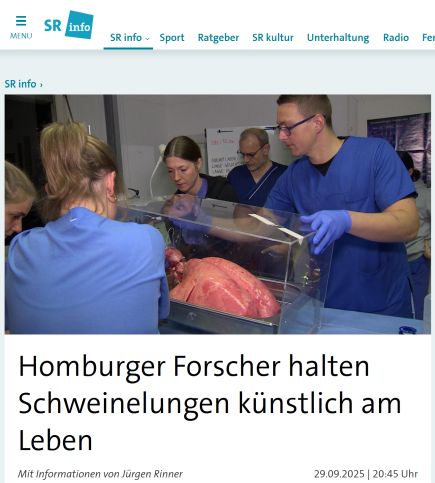 Auch SR Info berichtet auf ihrer Webseite:
Auch SR Info berichtet auf ihrer Webseite:
Forscher an der Uniklinik in Homburg haben ein Verfahren entwickelt, mit dem sie Schweinelungen künstlich am Leben halten können, um Wirkstoffe zu testen. Das soll Tierversuche teilweise ersetzen.
Das Forschungsprojekt ist interdisziplinär. Auch Messtechniker aus der Ingenieurswissenschaft sind involviert. Diese untersuchen beispielsweise Gasproben, also auch die Atemluft, auf Inhaltstoffe. Daraus lassen sich Rückschlüsse auf Wirkung, Dosierung und Verträglichkeit von Wirkstoffen gewinnen.
In Kürze wird das Team auf einem internationalen Kongress Ergebnisse vorstellen. Außerdem arbeitet es an einer zweiten Anlage, die eine Lunge 24 Stunden am Leben halten kann. Am Anfang der Forschung "überlebte" die Lunge übrigens nur zehn Minuten. Das war zu kurz für genauere Untersuchungen.
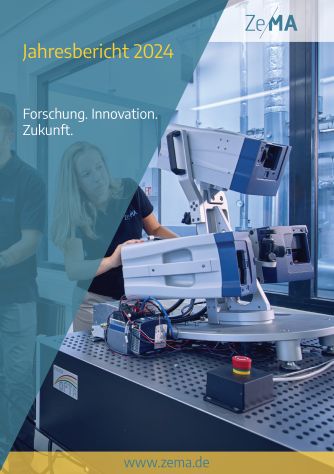 Im Jahresbericht 2024 des ZeMA mit dem Titel Forschung. Innovation. Zukunft. berichten die dort aktiven Arbeitsgruppen über ihre Tätigkeit.
Im Jahresbericht 2024 des ZeMA mit dem Titel Forschung. Innovation. Zukunft. berichten die dort aktiven Arbeitsgruppen über ihre Tätigkeit.Unsere Gruppe Data Engineering and Smart Sensors (inzwischen umbenannt in Multimodal Smart Sensors) ist Teil des Bereichs Smart Sensors und beschäftigt sich mit der Analyse von Sensor- und Maschinensignalen mittels maschinellem Lernen (ML), speziell für das Condition Monitoring, aber auch die prozessbegleitende Qualitätskontrolle. Dabei decken wir von der Daten- und Versuchsplanung über das Training bis zur Integration alle Schritte ab und sind der ideale Partner für industrielle ML-Anwendungen.
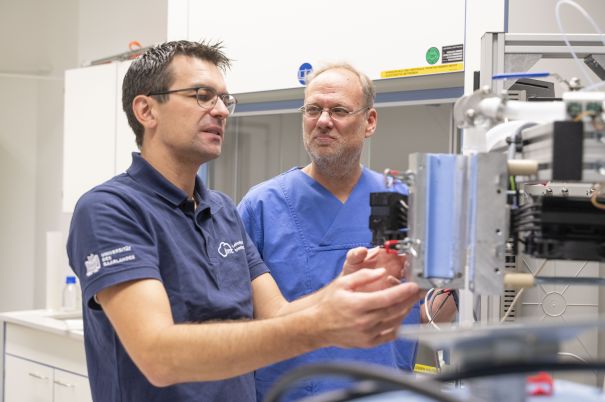 Die Lunge geschlachteter Schweine endet meist als Tierfutter oder wird gar entsorgt. Zwei Forschungsteams aus Medizin und Ingenieurwissenschaft haben an der Universität des Saarlandes ein Verfahren entwickelt, um solche „Schlachtabfälle“ als praxistaugliches und aussagekräftiges Lungen-Modell für die Forschung zu nutzen. Ziel ist es, Tierversuche zu ersetzen, zu reduzieren und diese sogar von deren Möglichkeiten und Aussagekraft her zu übertreffen.
Die Lunge geschlachteter Schweine endet meist als Tierfutter oder wird gar entsorgt. Zwei Forschungsteams aus Medizin und Ingenieurwissenschaft haben an der Universität des Saarlandes ein Verfahren entwickelt, um solche „Schlachtabfälle“ als praxistaugliches und aussagekräftiges Lungen-Modell für die Forschung zu nutzen. Ziel ist es, Tierversuche zu ersetzen, zu reduzieren und diese sogar von deren Möglichkeiten und Aussagekraft her zu übertreffen.
Die Mediziner halten die Lungen bis zu 24 Stunden stabil, was zuvor keiner anderen Gruppe weltweit gelungen ist.
Die saarländische Landesregierung fördert die Forschung.
Analyse der Ausatemluft mit Gassensorsystem
„Die sensortechnische Herausforderung in diesem Projekt liegt darin, die Substanzen in sehr geringen Konzentrationen zu messen. Die Ausatemluft besteht aus einem regelrechten Cocktail an vielen verschiedenen gasförmigen Stoffen, von Kohlendioxid, Stickstoff bis hin zu einer Vielzahl kleinster Spuren an Substanzen, die von Mensch zu Mensch und von Tier zu Tier variieren“, erklärt Christian Bur, der an neuartigen Gassensorsystemen forscht, um flüchtige organische Verbindungen immer genauer zu erfassen. Nun findet Christian Bur mit den feinen Technik-Sinnesorganen kleinste Spuren im Atemgas des Lungenmodells. „Dafür messen die Sensoren kontinuierlich die Konzentration bestimmter Substanzen und geben so Aufschluss über die in einem Zeitraum abgeatmete Menge. Zum Einsatz kommen hierfür Halbleitergassensoren auf Metalloxid-Basis. Ihre Signalauswertung verfeinern wir immer weiter“, erläutert Christian Bur. An der Forschung sind auf medizinischer wie auch auf technischer Seite zahlreiche Doktorandinnen, Doktoranden und auch Studierende beteiligt.
Kontakt:
Dr.-Ing. Christian Bur (Gruppenleiter für Gasmesstechnik)
Tel.: 0681-302/2256, E-Mail: c.bur(at)lmt.uni-saarland.de